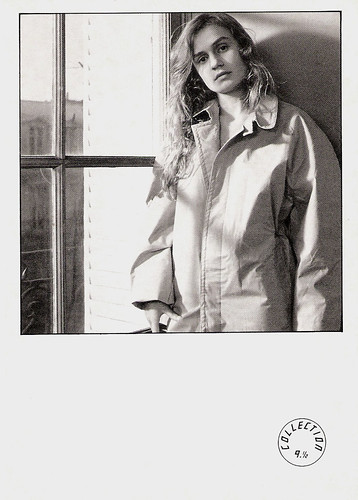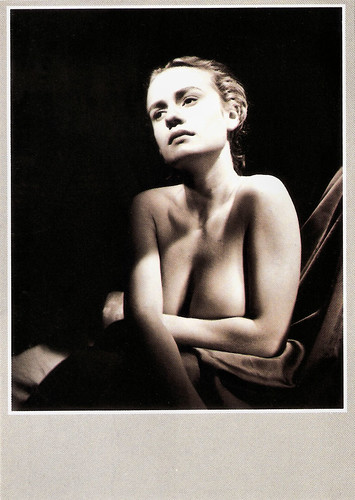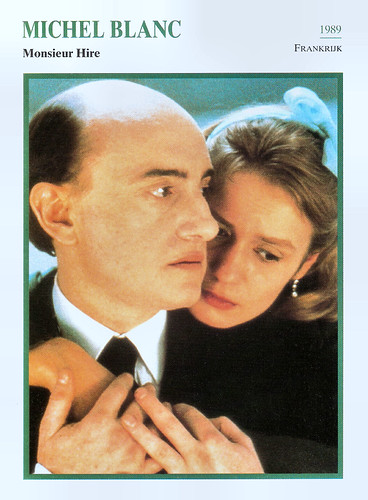
French postcard in the Collection 91/2 series by Editions Humour à la carte, Paris, no. ST-70.
Vagabond
Sandrine Bonnaire was born in 1967 in the town of Gannat, Allier, in the Auvergne region. She was born into a working-class family, the seventh of eleven children. Her acting career began at 16 in 1983, when she starred in the film À nos amours/For Our Loves (Maurice Pialat, 1983). She played Suzanne, a sixteen-year-old girl from Paris, who engages in a number of affairs in reaction to her miserable situation at home.
David Anderson reviews at Starland: "Just when you expect another titillating French romantic drama about young girls and lost innocence, Maurice Pialat takes us on a surprising and highly subjective guided tour of a damaged family’s personal pain. The film is comprised of shifting alliances and points of view, and presents the fragility of family dynamics in ways that range from subtle to harrowing." The film won the Prix Louis-Delluc for Best Film in 1983 and the César Award for Best Film in 1984. Bonnaire was also awarded the César Award in 1984 for Most Promising Actress.
With Pialat, she also made the romantic crime drama Police (Maurice Pialat, 1985). Written by Catherine Breillat, the film is about a moody, jaded police detective (Gérard Depardieu) who starts to investigate a Tunisian drug ring, falls for a mysterious woman (Sophie Marceau) and is drawn into a shady and dangerous scheme.
Bonnaire’s international breakthrough came when she played the main character, Mona, in Sans toit ni loi/Vagabond (1986), directed by Agnès Varda, for which she won her second César Award. Mona is a vagabond, who wanders through French wine country one winter and fails both physically and morally. The acclaimed film combines straightforward narrative scenes, in which we see Mona living her life, with pseudo-documentary sequences in which people who knew Mona turn to the camera and comment on what they remember about her. Significant events are sometimes left unshown so that the viewer must piece the information together to gain a full picture.
Then followed the French-Belgian drama La Puritaine/The Prude (Jacques Doillon, 1986) with Michel Piccoli, and another drama with Pialat Sous le soleil de Satan/Under the Sun of Satan (Maurice Pialat, 1987), starring Gérard Depardieu as a devout priest who tries to save the soul of Mouchette, a young girl who killed one of her lovers. The film won the Palme d'Or at the 1987 Cannes Film Festival.

French postcard in the Le jour se lève series by Editions Humour à la carte, Paris, no. ST-169. Photo: Jean-Pierre Larcher.
Object of affection
Sandrine Bonnaire starred as a girl who, whilst looking for her runaway brother, encounters a number of people who influence her life in another acclaimed drama, Les Innocents/The Innocents (André Téchiné, 1987). The film was partially inspired by a William Faulkner novel. Téchiné uses several French-Arab relationships to mirror the tensions between France and its former colonies. The film was nominated for four César Awards.
Her next film, Quelques jours avec moi/A Few Days with Me (Claude Sautet, 1988) with Daniel Auteuil, received three nominations at the 1989 César Awards.
An international success was Monsieur Hire (Patrice Leconte, 1989) starring Michel Blanc in the title role and Sandrine Bonnaire as the object of Hire's affection. The screenplay was based on the novel Les Fiançailles de M. Hire by Georges Simenon and is a remake of Julien Duvivier's film Panique/Panic (1947) with Michel Simon and Viviane Romance.
Bonnaire won new accolades with her leading role in the drama La captive du désert/Captive of the Desert (Raymond Depardon, 1990), which was entered into the 1990 Cannes Film Festival. The film was based in part on the experiences of Françoise Claustre who was captured by Chadian rebels in 1974, later joined by her husband, and the pair was finally released in 1977. Sandrine Bonnaire played Joan of Arc in the two-part film Jeanne la pucelle/Joan the Maiden (Jacques Rivette, 1994).
In 1995, she starred as an apparently simple maid in the widely acclaimed thriller La Cérémonie (Claude Chabrol, 1995), also with Isabelle Huppert. The film echoes the case of Christine and Lea Papin, two French maids who brutally murdered their employer's wife and daughter in 1933. The film and its stars won awards internationally, including for Best Actress at the Venice Film Festival for both Bonnaire and Huppert. She reunited with Chabrol for the sociological mystery Au cœur du mensonge/The Color of Lies (Claude Chabrol, 1999).

Dutch collectors card in the series 'Filmsterren: een portret' by Edito Service, 1995. Photo: Collection Christophe L. Publicity still for Monsieur Hire (Patrice Leconte, 1989) with Michel Blanc.
Intimate strangers
In 2004, Sandrine Bonnaire starred with Fabrice Luchini in another film by Patrice Leconte, Confidences trop intimes/Intimate Strangers, which was an arthouse box office hit in the United States. She played a troubled woman, who on her initial appointment seeking psychiatric counselling, mistakenly enters a tax accountant's office, and an unusual relationship develops.
David Anderson at Starland: "It is a credit to the acumen of Luchini and Bonnaire that the story remains squarely on track as, on paper, it seems a bit far-fetched, yet there is never a moment here that feels forced or manipulative. Leconte presents a number of interesting observations on the nature of therapy itself by having virtually every character in the film, at one time or another, offer help and advice, usually with results that are more amusing than beneficial. Bonnaire’s ham-fisted attempt to cure a claustrophobic man is a welcome bit of comic relief, and reinforces the idea that therapy should usually be left to the professionals."
Her later films include Un cœur simple/A Simple Heart (Marion Laine, 2008) an adaptation of one of Gustave Flaubert's Three Tales, Salaud, on t'aime (Claude Lelouch, 2014) with Johnny Hallyday, and the international thriller Dusha shpiona/The Soul of a Spy (Vladimir Bortko, 2015).
Bonnaire has a daughter, Jeanne (1994), from a relationship with actor William Hurt, whom she met in 1991 during the filming of the Albert Camus novel La Peste/The Plague (Luis Puenzo, 1991). They acted together in the international crime drama Ispoved neznakomtsu/Secrets Shared with a Stranger (Georges Bardawil, 1995).
From 2003 to 2015 she was married to actor and screenwriter Guillaume Laurant, with whom she had a second daughter, Adèle (2004). In 2017, Sandrine Bonnaire played in Prendre le large (Gael Morel, 2017) a middle-aged factory worker, whose life is upended when she follows her employer to Morocco. Another interesting film was L'événement/Happening (Audrey Diwan, 2021), an adaptation of Annie Ernaux's novel of the same name, looking back on her experience with abortion when it was still illegal in France in the 1960s.
DVD Trailer Monsieur Hire (Patrice Leconte, 1989). Source: KinoInternational (YouTube).
Sources: David Anderson (Starland), Wikipedia and IMDb.
This post was last updated on 2 July 2023.
No comments:
Post a Comment